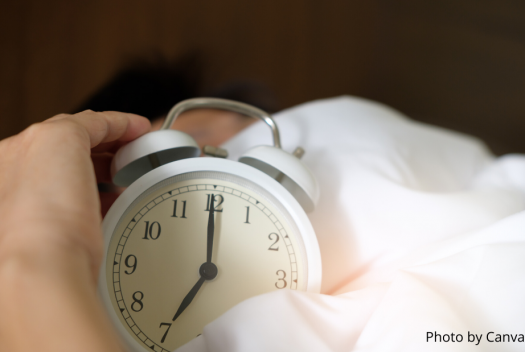By: Annabelle Shaffer, BS, Master’s candidate in the Division of Nutritional Sciences at University of Illinois Urbana-Champaign
In today’s fast-paced world, we often feel pressured to reduce sleep to increase productivity. However, studies show that this is actually an ineffective method (Massar, Lim and Huettel, 2019). Lack of sleep affects us in other ways than productivity – such as what we eat!
Studies consistently show that reduced amount or quality of sleep, less than the recommended 7-9 hours per evening, correlates with obesity (Chaput, 2014). There are several ways this can happen.
Changes in appetite hormones:
In our bodies, we have two essential hormones that regulate appetite. Ghrelin is released to signal our body is low in energy and needs food. Leptin is released when we have sufficient energy, and no more food is needed. Studies show that ghrelin increases and leptin decreases when we’re low on sleep (McNeil et al., 2013). This ultimately leads to excessive eating.
Increased snacking, especially at night:
Snacks can be a healthful way to control appetite throughout the day. Consuming nutrient-dense snacks, such as fresh fruit, low-fat dairy, or nuts can prevent excessive hunger and provide several vitamins and minerals. Frequent late-night eating, however, is associated with elevated body mass index and reduced blood sugar control which are risk factors for diabetes (Gouda et al., 2018).
Preference for energy-rich foods:
A clinical study found that in addition to generalized increased food intake, people with reduced sleep have a higher preference for high-fat food items, especially late at night (Spaeth et al., 2013).
Sleep impacts diet…but does diet impact sleep?
Caffeine-containing items can disrupt sleep. There is some evidence that macronutrient distributions and foods could benefit sleep. However, there is not strong enough evidence available to provide therapeutic nutrition recommendations (St-Onge et al., 2016).
How can we improve our sleep quality?
The Centers for Disease Control and Prevention recommends 7-9 hours of sleep per evening in adults, with more hours recommended for teens and children (CDC, 2020). We can improve our sleep by:
- Setting a consistent bedtime and wake-up time, even on weekends
- Sleeping in a quiet, dark room
- Removing electronics such as cell phones and televisions from your bedroom
- Practicing meditation and yoga
- Including daily physical activity
- Avoiding large meals, alcohol, and caffeine near bedtime
References
CDC – How Much Sleep Do I Need? – Sleep and Sleep Disorders. Cdc.gov. (2020). Retrieved 2 March 2020, from https://www.cdc.gov/sleep/about_sleep/how_much_sleep.html.
Chaput, J. (2014). Sleep patterns, diet quality and energy balance. Physiology & Behavior, 134, 86-91. https://doi.org/10.1016/j.physbeh.2013.09.006.
Gouda, M., Matsukawa, M., & Iijima, H. (2018). Associations between eating habits and glycemic control and obesity in Japanese workers with type 2 diabetes mellitus. Diabetes, Metabolic Syndrome And Obesity: Targets And Therapy, Volume 11, 647-658. https://doi.org/10.2147/dmso.s176749.
Massar, S., Lim, J. and Huettel, S. (2019). Sleep deprivation, effort allocation and performance. Sleep Deprivation and Cognition, pp.1-26.
McNeil, J., Chaput, J., Forest, G., & Doucet, E. (2013). Hormones and behavior (pp. 105-120).
St-Onge, M., Mikic, A., & Pietrolungo, C. (2016). Effects of Diet on Sleep Quality. Advances In Nutrition, 7(5), 938-949. https://doi.org/10.3945/an.116.012336.
Photo by Canva.













